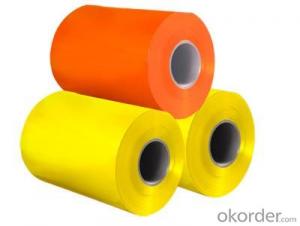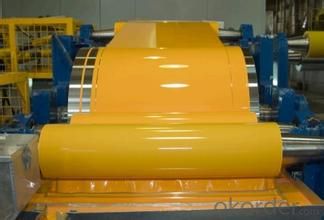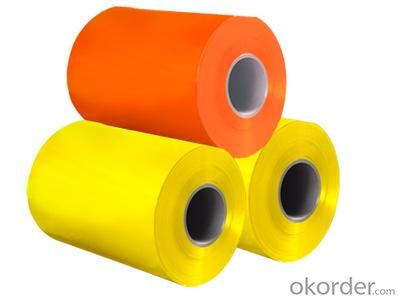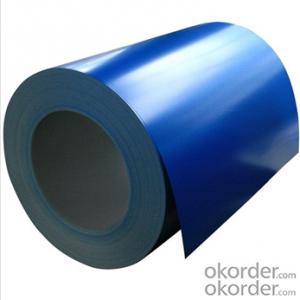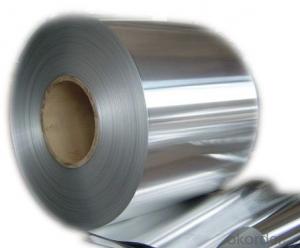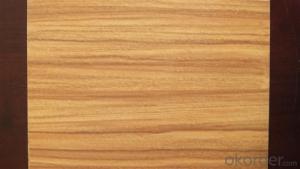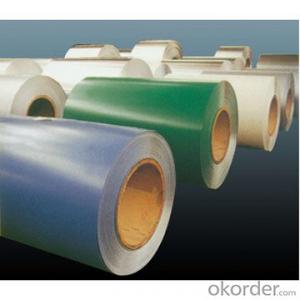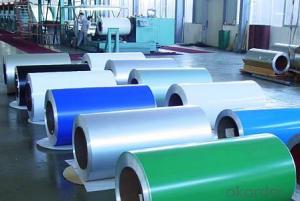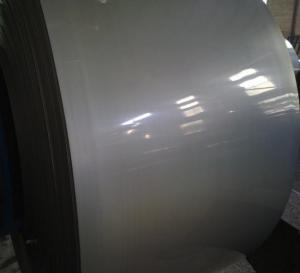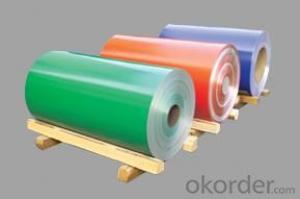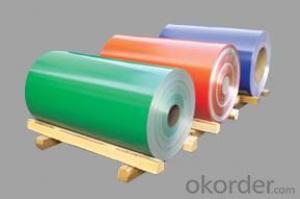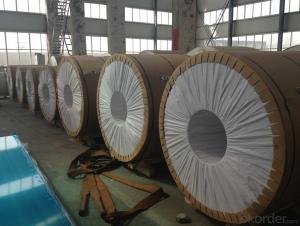Pre painted aluminum coil,roll
- Loading Port:
- China Main Port
- Payment Terms:
- TT OR LC
- Min Order Qty:
- -
- Supply Capability:
- -
OKorder Service Pledge
OKorder Financial Service
You Might Also Like
Aluminium is a relatively soft,durable, lightweight, ductile and malleablemetalwith appearance ranging from silvery to dull gray, depending on the surfaceroughness. It is nonmagnetic and does not easily ignite. A fresh film ofaluminium serves as a good reflector (approximately 92%) of visible light and an excellent reflector (asmuch as 98%) of medium and far infrared radiation. The yield strengthof pure aluminium is 7–11 MPa, while aluminium alloys have yield strengths ranging from200 MPa to 600 MPa. Aluminium has about one-third the density and stiffness of steel.It is easily machined, cast, drawn and extruded.
Aluminium alloys (or aluminum alloys; see spellingdifferences) are alloysin which aluminium(Al) is the predominant metal. The typical alloying elements are copper, magnesium,manganese,silicon,tin and zinc. There are twoprincipal classifications, namely casting alloys and wrought alloys, both of which are furthersubdivided into the categories heat-treatableand non-heat-treatable. About 85% of aluminium is used for wrought products,for example rolled plate, foils and extrusions.Cast aluminium alloys yield cost-effective products due to the low meltingpoint, although they generally have lower tensile strengthsthan wrought alloys. The most important cast aluminium alloy system is Al–Si,where the high levels of silicon (4.0–13%) contribute to give good castingcharacteristics. Aluminium alloys are widely used in engineering structures andcomponents where light weight or corrosion resistance is required
Features:
1. Excellent quality of products
2. Quick delivery
3. Best service to clients
4. BV,SGS avalible
5. No buckle o waveness
6. Tension leveling
7. Certificate of Origin
8. Form A,E
Packaging Detail: Carton ,Wooden pallet with plastic protection packing,standard seaworthy packing or as your request.
ProductionCapacity:
AnnualProduction capacity of 600,000 tons.
Products areexported to United States, Canada, U.A.E, Brazil, Mexico,Thailand, Vietnam,Nigeria etc, over 100 countries andregions all over the world.
Coveredfactories with full production line
CNBM aluminumproduction base is comprised of 18 aluminumannealers, 10 coil and foilmills, 4 continuous production lines, 2hot rolling production line and 3prepainted lines.
FAQ:
1. What is the form of payment?
Normally 30% TT, L/C
2. Type of quotation?
FOB, CFR, CIF
3. Port of loading?
Shanghai port
4. Delivery time?
30 day after client’s deposit
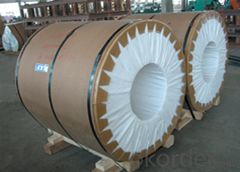
- Q: How much is a ton gate of Jiangxi aluminium roll?
- Hello, roll gate is usually calculated according to the square count. Is there your Lian Xi?Want to know the size of your installation? The following guidelines and measurement for your reference, you can go out according to the guidelines for measuring hole length and width, a specific size can determine the lattice dielectric.
- Q: When you are cooking fish? I ran out of aluminum foil, all I have is parchment paper on hand. Does it matter or affect the way the fish gets cooked? Just wondering what the difference is, if any.
- Aluminum foil will heat faster and retain that heat. Parchment paper will retain little heat but the fish won't stick to it when you remove it from the oven.
- Q: This question asks for the distinctions between two forms of aluminum used in various industries: coils and sheets.
- <p>Aluminum coil and aluminum sheet are both flat aluminum products but differ in form and usage. Aluminum coil is a long, continuous roll of aluminum that can be easily cut to length and is often used for manufacturing processes like stamping, bending, and forming. It's ideal for applications requiring a consistent and uniform supply of material. On the other hand, aluminum sheet is a flat, rectangular piece of aluminum with a specific thickness, width, and length. It is used for applications where a single piece of material is needed, such as in construction, signage, and decorative purposes. The main difference lies in the form factor and the way they are used in manufacturing and construction processes.</p>
- Q: I have a aluminum sign that I store in the garage and it got a couple specks of rust on it which I don't like because I use it for my DJ shows. How can I get rid of the rust before it gets too bad without painting over it?
- Aluminum doesn't rust.
- Q: Describe the steps involved in the production of aluminum coil.
- <p>The process of making aluminum coil involves several key steps. Initially, raw materials, typically bauxite ore, are mined and then refined to produce aluminum oxide. This aluminum oxide is then reduced to aluminum metal through the Hall-H茅roult process, where it is dissolved in molten cryolite and electrolyzed to extract aluminum. Once the aluminum is produced, it is melted and then continuously cast into large slabs or billets. These slabs are then hot or cold rolled to reduce their thickness and width, forming coils. The coils are annealed to improve their mechanical properties and surface finish. Finally, the aluminum coils are cleaned, inspected, and cut to size before being packaged and shipped to customers for various applications such as construction, automotive, and packaging.</p>
- Q: Is it safe and appropriate to use aluminum coils for food packaging?
- <p>Yes, aluminum coils can be used for food packaging. Aluminum is a common material in the food packaging industry due to its lightweight, durability, and excellent barrier properties against light, oxygen, and moisture. It is widely used in the production of flexible packaging, such as pouches, laminates, and foils. However, it's important to ensure that the aluminum coils meet food-grade standards and are used in accordance with food safety regulations to prevent any contamination or health risks.</p>
- Q: What are some common applications for aluminum coils?
- Some common applications for aluminum coils include manufacturing of roofing materials, HVAC systems, automotive parts, electrical wiring, packaging materials, and construction materials.
- Q: Can aluminum coils be used for electrical enclosures?
- Yes, aluminum coils can be used for electrical enclosures. Aluminum is a lightweight and durable material that provides excellent electrical conductivity and heat dissipation properties. It also has good corrosion resistance, which makes it suitable for various environmental conditions. Aluminum coils can be easily formed into different shapes and sizes, making them versatile for enclosure designs. Additionally, aluminum is a cost-effective option compared to other metals like stainless steel. However, it is important to ensure proper insulation and grounding when using aluminum coils for electrical enclosures to prevent any electrical hazards.
- Q: What are the different coil coating options for aluminum coils?
- There are several different coil coating options available for aluminum coils, each offering unique benefits and characteristics. 1. Polyester: Polyester coil coatings are the most commonly used option for aluminum coils. They provide excellent durability and resistance to weathering, making them suitable for outdoor applications. Polyester coatings also offer good color retention and are available in a wide range of colors and finishes. 2. Polyvinylidene Fluoride (PVDF): PVDF coatings are known for their exceptional performance and durability. They have excellent resistance to UV rays, chemicals, and extreme weather conditions. PVDF coatings also provide outstanding color retention and maintain their appearance for a longer period of time, making them ideal for architectural applications. 3. Polyurethane: Polyurethane coatings offer a high level of resistance to abrasion, chemicals, and corrosion. They provide good adhesion and flexibility, allowing for easy forming and bending of the coated aluminum. Polyurethane coatings are often used in industrial applications where durability and protection are crucial. 4. Silicone-modified Polyester (SMP): SMP coatings combine the benefits of both polyester and silicone coatings. They offer excellent resistance to fading, chalking, and environmental pollutants. SMP coatings provide good flexibility and adhesion, making them suitable for a wide range of applications. 5. Epoxy: Epoxy coatings are known for their excellent adhesion and corrosion resistance. They provide a hard, durable finish that is resistant to chemicals and abrasion. Epoxy coatings are commonly used in industrial settings where harsh conditions are present. 6. Plastisol: Plastisol coatings are typically used in applications that require a textured or decorative finish. They offer good flexibility and impact resistance. Plastisol coatings can be customized with various patterns and textures to enhance the appearance of the coated aluminum. Overall, the choice of coil coating option for aluminum coils depends on the specific requirements of the application, such as the desired level of durability, weather resistance, color retention, and appearance. It is important to consider these factors when selecting the most suitable coating option for your aluminum coils.
- Q: How are aluminum coils protected against scratching?
- Aluminum coils are typically protected against scratching through various methods such as applying a protective film or coating, using protective packaging materials, or employing proper handling and storage procedures to minimize contact with abrasive surfaces.
Send your message to us
Pre painted aluminum coil,roll
- Loading Port:
- China Main Port
- Payment Terms:
- TT OR LC
- Min Order Qty:
- -
- Supply Capability:
- -
OKorder Service Pledge
OKorder Financial Service
Similar products
Hot products
Hot Searches
Related keywords

